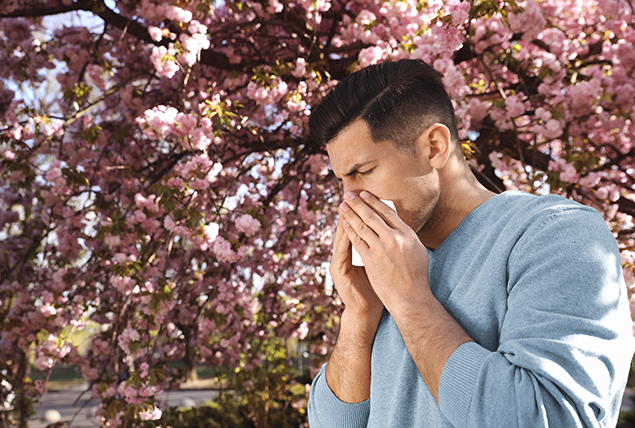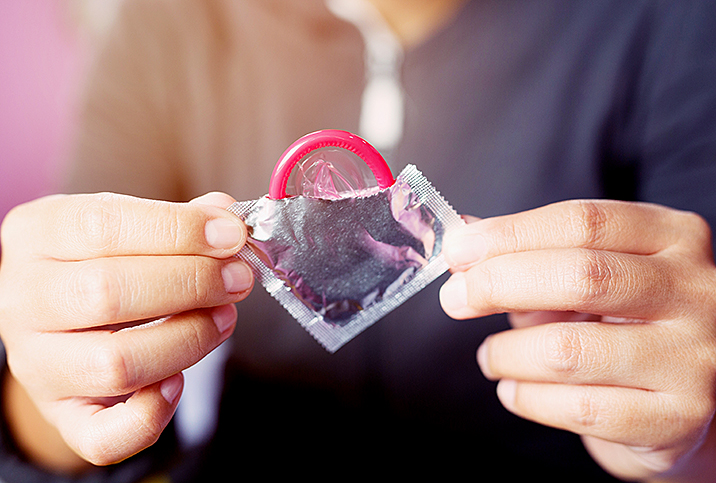Diagnosing Allergies to Improve Sexual Health

Symptoms of allergies can vary, but untreated, those symptoms can cause significant disruptions to a person's lifestyle—including their sexual health.
Allergies often mimic the symptoms of colds and other viral infections, which means they're tricky to diagnose and treat. You can even be allergic to semen. So how do you know if you have allergies?
What are allergies?
Allergies occur when the immune system detects something foreign in the body. Roughly 25 percent of adults in the United States have at least one allergy, according to the Centers for Disease Control and Prevention (CDC).
The types of allergies include the following:
- Chemical allergies: Perfumes, cosmetics, soaps and antibacterial agents.
- Drug allergies: Penicillin and aspirin.
- Food allergies: Shellfish, peanuts, soy and fruit.
- Miscellaneous: Latex, dust, dust mites, pet saliva and pet dander.
- Seasonal and environmental allergies: Pollen, grass, ragweed and mold.
The most common type of allergies is seasonal outdoor allergies. A whopping 81 million people in the U.S. received a hayfever, or seasonal allergic rhinitis, diagnosis in 2021, according to the Asthma and Allergy Foundation of America (AAFA).
"Many different types of allergies exist. The most common environmental allergies, or pollen allergies, include different kinds of pollen, like trees, grasses and weeds," said Shuba Iyengar, M.D., an allergist and immunologist and chief medical officer at Allermi Medical Associates, based in San Francisco.
Depending on where you live, a type of outdoor allergy may not be a year round problem for you. In fact, your seasonal allergies may only flare up during certain months of the year.
"Environmental allergies include indoor things, like dust mites, often found in the bedding," Iyengar said. "When people have environmental allergies, they can get itchiness of their eyes or nose, sometimes sneezing, nasal congestion and runny nose."
How do I know if I have allergies?
Since allergies mimic other health issues, such as a cold or general fatigue, it's hard to know if you have allergies or something else.
"Allergies can be diagnosed by the type of symptoms and pattern of symptoms that someone has," Iyengar said.
If you suspect you have allergies, but you aren't sure what you're allergic to, an allergy specialist can help with a simple test.
"A person can also go and see an allergist and get a special kind of testing, called skin prick testing, done in the allergy office to see what the probability is that they have environmental allergies," she said.
How can allergies affect your sex life?
Remember what happened in the movie "Hitch" when Will Smith's character makes a mad dash to the nearest pharmacy for a "juice box" of antihistamines? It may seem hilarious in the movies, but it's not so funny when it happens to you.
An allergic reaction can be life-threatening.
It can be challenging if you find out your partner is allergic to pets when you're a pet owner. A latex allergy can make it trickier to practice safer sex. Never be afraid to communicate with your date about your allergies—or their severity.
Seasonal allergies, although easier to treat with medication, can creep up on you when you least expect it. Don't let an allergic reaction ruin your intimate moments.
"Allergies, especially when untreated, can cause fatigue and sleep problems, which can definitely affect a person's sexual health," Iyengar said.
What are the best allergy medications?
If you have allergies, your doctor will help you figure out the best treatment option to get them under control. Discuss treatment options with an allergist to determine which will be best for you—before allergy season begins.
Treatment options for allergies include the following:
- Allergen immunotherapy, such as an allergy shot or sublingual immunotherapy (SLIT)
- Daily pill or liquid, such as Prednisolone (Prelone), Prednisone (Prednisone Intensol, Rayos) or Methylprednisolone (Medrol)
- Skin cream, or corticosteroids
- Eye drops
- Nasal sprays
- Over-the-counter remedies
- Emergency epinephrine shots, for severe allergy triggers
Certain treatments, such as sublingual immunotherapy and allergy shots, require frequent allergy clinic visits. For a severe allergic life-threatening reaction, or anaphylaxis, your doctor will show you how to use epinephrine auto injectors.
"Allergy shots involve getting small amounts of what a person is allergic to weekly for several months, then monthly for several years. Allergy shots are very effective for environmental allergies, but take almost a year to have a noticeable effect, and require several years of treatment," Iyandar said.
Some treatment options for hay fever, such as a Kenalog injection, don't cure your allergies, but help to suppress your immune system, so you can find allergy relief when the pollen count increases.
Food allergies may have more severe symptoms and require that you carry an EpiPen, especially if you're at risk for anaphylaxis, or when the body goes into shock.
What are effective over-the-counter allergy medicines?
Many effective over-the-counter allergy medications are on the market today. However, not all allergy medicines are created equal. Some OTC medications, such as those containing antihistamine, may cause drowsiness.
Prescription medications and OTC medicines that may cause drowsiness include:
- Diphenhydramine
- Chlorpheniramine
"One of the most effective environmental allergy treatments is nasal sprays because they directly target the symptoms where they start, which is the inside of the nose. They are often very effective," Iyengar said.
"In addition, they tend to cause fewer side effects than an allergy pill because they rarely cross into the bloodstream," she added.
Your doctor will suggest a treatment plan to help improve your quality of life. Yes, you can safely manage your allergies while pregnant.
The bottom line
Don't let allergies bring you down. The symptoms of an allergic reaction can vary. Common allergens, such as tree pollen or pet dander, can make you miserable. There is help.
Talk to your doctor if you're experiencing an allergic reaction and don't know why. For people with food allergies, an allergic response can be deadly. Don't hesitate to call 911.
Consider a blood test or a skin prick test to determine your allergies so you can find sweet, sweet relief.


















